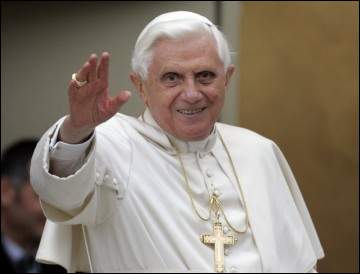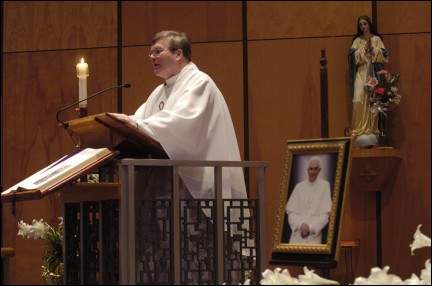Benedict Due Tuesday for 6-Day Visit, His First to U.S. As Pontiff
By Gary Soulsman
News Journal
April 13, 2008
http://www.delawareonline.com/apps/pbcs.dll/article?AID=/20080413/NEWS/804130366
When Pope John Paul II last visited cities along the East Coast in 1995, he was something of a superstar, met by warm, welcoming crowds who felt connected to a holy man who had traveled to the U.S. and other nations for 17 years.
When Pope Benedict XVI arrives in Washington, D.C., on Tuesday, he is close to his third anniversary as pope and will introduce himself on a first visit as pontiff with lots of media attention.
"One of the pluses is that people will get to know him better," said the Rev. Tom Flowers, whose parishioners at St. Polycarp Church in Smyrna have been praying for the pope.
 |
| Pope Benedict XVI |
Flowers and members of the Diocese of Wilmington will be among 400 residents of the Delmarva Peninsula who will attend the pope's Mass in Washington on Thursday.
"I think they'll see the pope's pastoral side, which includes his warmth, sincerity and the clarity of his teachings on Christ's love," Flowers said.
At the same time, there are policy issues that many of the nation's 67 million Catholics have questions about: How will Benedict address the sexual-abuse issue in the church, with several dioceses in bankruptcy and more than $2 billion in settlements? Will he criticize Catholic universities as not Catholic enough? Will his pro-life positions sound like censure on the abortion issue? Will what he says influence the presidential race now under way?
"Everybody has their list of issues, hoping he'll address x, y or z," Flowers said.
Catholics around the world will be watching during the six days of his visit, trying to read between the lines. They know anything is subject to controversy.
For example, a short passage in a 2006 scholarly address at the University of Regensburg on coercion in conversion was condemned by Muslims, with the pope burned in effigy in the Middle East, said blogger Amy Welborn of Fort Wayne, Ind.
The pope later apologized and said people misunderstood his quoting a 14th century Byzantine emperor, and his use of the phrase "evil and inhuman" in reference to Muhammad's allowing the faith to be spread with a sword. "The joke among bloggers is that it's one line buried in a complex speech that will cause headlines," Welborn said.
Ironically, the Islamic problem was scripted. Often the pope is clear and engaging when answering questions off-the-cuff, she said.
The pope actually will be addressing three groups while he's in the States: the world at large, the greater American community and fellow Catholics, said John Allen, who is often in Rome as a longtime Vatican watcher for The Catholic Reporter.
Allen and many others expect Benedict to be encouraging. They believe he'll steer away from politics and point to all the good that can be achieved by following church teachings.
 |
| The Rev. Tom Flowers, pastor of St. Polycarp Church in Smyrna, says he and his parishioners are praying for Pope Benedict XVI, who will arrive in the U.S. on Tuesday. A portrait of the pope can be seen in the background. Photo by Scott Nathan |
It's Benedict's way of working to revitalize the church, which is the area's largest faith, with more than 220,000 Catholics in Delaware and the Eastern Shore of Maryland.
Yet, surveys show that only 32 percent of American Catholics worship on a weekly basis. Another third almost never attend Mass.
In his three years as pope, Benedict has not scolded people on his travels, but has tended toward a strong affirmation of classic doctrine, Allen said.
It's unfair to think of Benedict as an old-world hard-liner coming to a new world of sinful brazenness that makes him cringe, said blogger Thomas Peters of Washington, who writes the American Papist blog.
In fact, the pope repeatedly says he finds much to admire in the nation's freedoms as well as its generosity toward the third world, said Brennan Pursell, of Allentown, Pa., a historian and author of "Benedict of Bavaria," a portrait of the pope and his homeland.
Reaching out to everyone
The theme of Benedict's visit, expected to cost $10 million in donations, is Christ Our Hope. And in a video message, released to the world last Wednesday, he said he was coming to America "to reach out spiritually to all Catholics" and extend "a sign of friendship for members of other religious traditions and all men and women of good will."
For the Vatican, it was an intriguing use of new media, says Rocco Palmo of Philadelphia on his Whispers in the Loggia blog. He sees it as hopeful, too, given that many have observed that people know little about Benedict, compared with John Paul.
John Paul was pope for 26 years and became a superstar, partly because of his longevity and because of his gifts as an actor, mystic and poet.
Something of an extrovert, John Paul was willing to mix and mingle with popular culture, the blogger Welborn said.
By contrast, Benedict is a scholarly man from the farming regions of Bavaria who is still finding his way in a new position, Pursell said. He was a standout as a professor of theology at German universities for 26 years, having a genius for "a Mozart-like ability with words and ideas" that helps people experience the beauty of faith.
"It's a reason his writing has been so popular and people are eager to hear his homilies," Pursell said.
Benedict is not one to speak in sound bytes. That means the public will understand him best if they pay close attention to explanations that draw on an encyclopedic knowledge of theology, history and philosophy, Allen said.
About 50 percent of Americans view the pope favorably, and good will seems to be growing, according to a U.S. poll taken within the past month by The Pew Forum on Religion and Public Life.
But outside of devout Catholics, who have read the pope's bestselling books and followed his encyclicals on love and hope, his personality and skill have not come across to most Americans, said Luis Lugo, director of the Pew Forum.
Yet, worldwide donations to the church have almost doubled since he was elected pope, biographer Pursell said, and weekly audiences at the Vatican are up 40 percent over the time of John Paul.
Americans may find this startling, partly because Benedict had an initial burst of bad publicity, Pursell said.
As head of the Congregation for the Doctrine of the Faith for 24 years prior to becoming pope, then-Cardinal Joseph Ratzinger was responsible for sanctioning those he felt were not following church teachings. For example, he was critical of Latin American theologians who mixed politics and church work in liberation theology.
When Ratzinger was elected, he was called "God's Rottweiler" for his enforcement role.
"One of my favorite lines is that when he was Cardinal Ratzinger, he was in charge of saying no," said the blogger Peters. "As Pope Benedict, he's in charge of saying yes."
And, Flowers says, Benedict looks delighted in the role, "like a kid in a candy store," not a man who once talked about retirement before becoming pope.
Pope will give 11 talks
The pontiff will fly into Washington on Tuesday, then fly to New York on Friday, giving 11 talks and conducting informal meetings.
Benedict's visit "is a kind of getting-to-know-you opportunity," said Catherine P. Weaver, superintendent of schools in the Diocese of Wilmington.
She'll be among 400 Catholic educators who will meet with the pope Thursday afternoon. She expects a warm, enthusiastic meeting, with the pope encouraging their calling.
While he's here, Benedict will celebrate his 81st birthday; pray with bishops and seminarians; hold interfaith dialogues and visit a Manhattan synagogue on the eve of Passover; stroll about the south lawn of the White House with 5,000 guests, including Wilmington's Brother Ronald Giannone; visit Ground Zero; hold a youth rally; and celebrate three Masses, two of which will be large stadium affairs.
He will congratulate a handful of the nation's oldest dioceses on their 200th anniversary and has been invited to give a 20-minute address to the United Nations, which is how the trip actually started.
During his U.N. speech, he's expected to stress the need for peace, defense of life and protection of the environment, as well as a hope that one day universal moral truths and the protection of human rights can unite all people, Allen said.
The pope will address the sexual-abuse crisis in speaking with the nation's 350 bishops on Wednesday after a late-afternoon worship, Allen said. He expects him to express deep regret for the crisis, thank the bishops for their work with victims and offenders while calling for vigilance so more problems don't arise.
In more public venues, Allen expects the pope to offer "a note of appreciation for Catholics who have stuck with the church despite everything that has happened."
Meanwhile, the need to teach a strong Catholic doctrine in institutions of higher learning will come up when he meets educators Thursday afternoon, Peters said.
And in some of his public appearances, the pope is expected to affirm traditional marriage and pro-life teachings.
"He'll put it a positive way -- sex is for marriage and youth should be especially cared for in sexual education," Peters said.
In general, he'll use reason, logic and the inspiration of Scripture to call people to the faith, Flowers said.
Strike, protests possible
In visiting America, Benedict will find a church with a wide range of views. Already, a Catholic teachers union called the Lay Faculty Association has authorized a strike at 10 New York-area schools over compensation during Benedict's visit.
Gays and lesbians have announced they will protest because they believe the pope has not been a caring shepherd to them.
And Voice of the Faithful, a reform organization within the church with 35,000 members, took out a full-page ad in the New York Times last week, saying that the sexual-abuse crisis is not yet over. They have called for greater accountability and input from laity.
They're also unhappy that Cardinal Bernard Law, the archbishop of Boston who stepped down because of his record of reassigning priests with a record of sexual abuse, is now assigned to a basilica in Rome.
Still, most Americans will express some kind of curiosity that the pope is here and most Catholics will be grateful he finds the American church worth visiting, Flowers said.
"I believe he'll come as a pastor, not as a theologian or a politician," he said. "As our election year has shown, we're a country interested in unity. I believe the pope will strike a similar chord. He speaks for unity and the healing of division."
Contact Gary Soulsman at 324-2893 or gsoulsman@delawareonline.com
Any original material on these pages is copyright © BishopAccountability.org 2004. Reproduce freely with attribution.